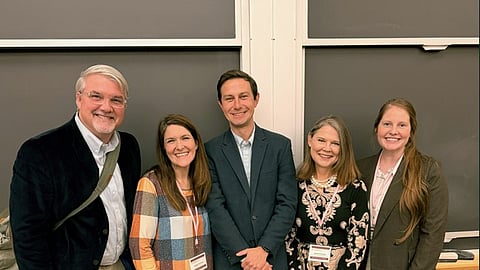
- Home
- Topic Areas
- Newsletter
- Podcast
- 100 Families Initiative
- About
- Connect
- Restore Hope

Harvard University became a hub for innovation and breakthrough collaboration at the 2025 Human Services Summit: Forging a Vibrant Future. Among the national leaders invited to share their work were representatives from Restore Hope and the Arkansas Governor’s Faith-Based Office, highlighting Arkansas’s growing role in redefining approaches to strengthening systems and improving outcomes for families.
Restore Hope’s Paul Chapman (Executive Director) and Karen Phillips (Chief Operating Officer) joined former Arkansas DHS Secretary Kristi Putnam to present on Leveraging an Ecosystem and Technology Hub to Support Families in Arkansas. The presentation highlighted the Restore Hope Model and the Governor’s 10:33 Initiative, which together form a collaborative, data-informed approach to helping families achieve stability and self-sufficiency.
The Restore Hope team shared how the 100 Families Initiative—a cornerstone of the model—has united community partners, law enforcement, local governments, and nonprofits around shared data and coordinated case management.
This model has led to measurable success, including a 50% reduction in foster care placements, 30% drop in local incarceration, and 20% reduction in crime in participating communities. Families served have experienced a 108% increase in financial stability, 79% improvement in housing stability, and 50% increase in full-time employment among the participants.
At Harvard’s Maxwell Dworkin Hall, the Arkansas delegation demonstrated how technology and collaboration can transform human services. Chapman and Phillips provided a detailed walk-through of Restore Hope’s integrated data platform, illustrating how assessments, team structures, and real-time dashboards enable families to access comprehensive, wraparound support.
Secretary Putnam shared insights on the leadership and vision required to break down silos and empower local communities, while Warbington connected the work to the Governor’s 10:33 Initiative—a statewide effort focused on building pathways from crisis to contribution.
The Restore Hope presentation drew strong engagement from national experts in attendance, underscoring how Arkansas’s holistic approach to family stabilization is being recognized as a national blueprint for systemic change. Justin Brown’s reflections further highlighted how this model helps meet the transformational needs of HHS across the nation.
A Shared Commitment to Human Flourishing
This year’s summit, themed Forging a Vibrant Future, emphasized collaboration across agencies, innovation in service delivery, and the pursuit of human flourishing. Hosted by Harvard’s Leadership for a Networked World program, the event featured sessions on artificial intelligence, child care reform, and human-centered transformation.
Restore Hope’s inclusion alongside leading experts from states such as Wyoming and Michigan positioned Arkansas at the forefront of the movement to reimagine how human services can empower individuals, strengthen families, and revitalize communities.
Smart Justice is a magazine, podcast, and continuing news coverage from the nonprofit Restore Hope and covers the pursuit of better outcomes on justice system-related issues, such as child welfare, incarceration, and juvenile justice. Our coverage is solutions-oriented, focusing on the innovative ways in which communities are solving issues and the lessons that have been learned as a result of successes and challenges.
The podcast is available on all major podcasting platforms.
Subscribe to the Smart Justice newsletter.
